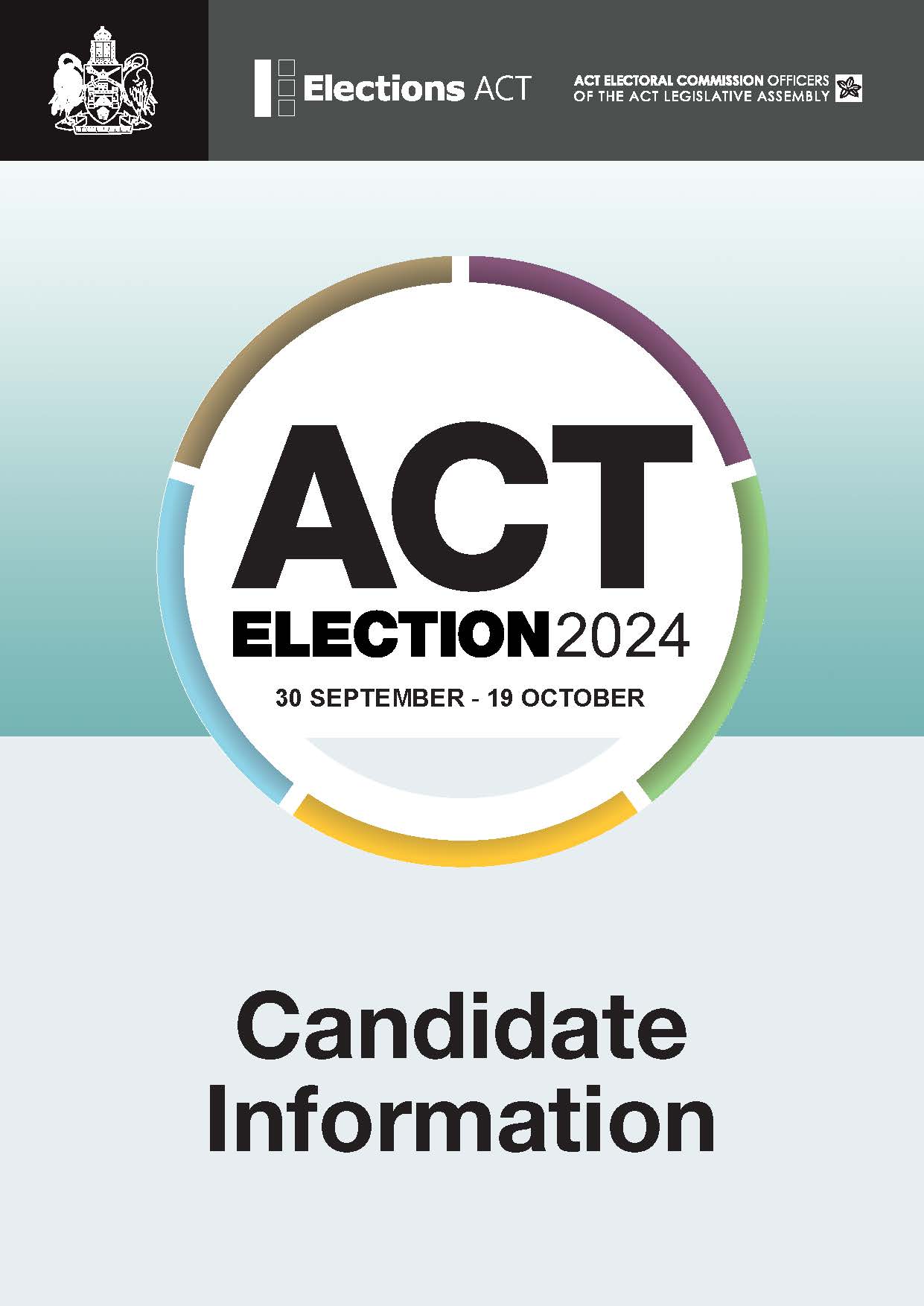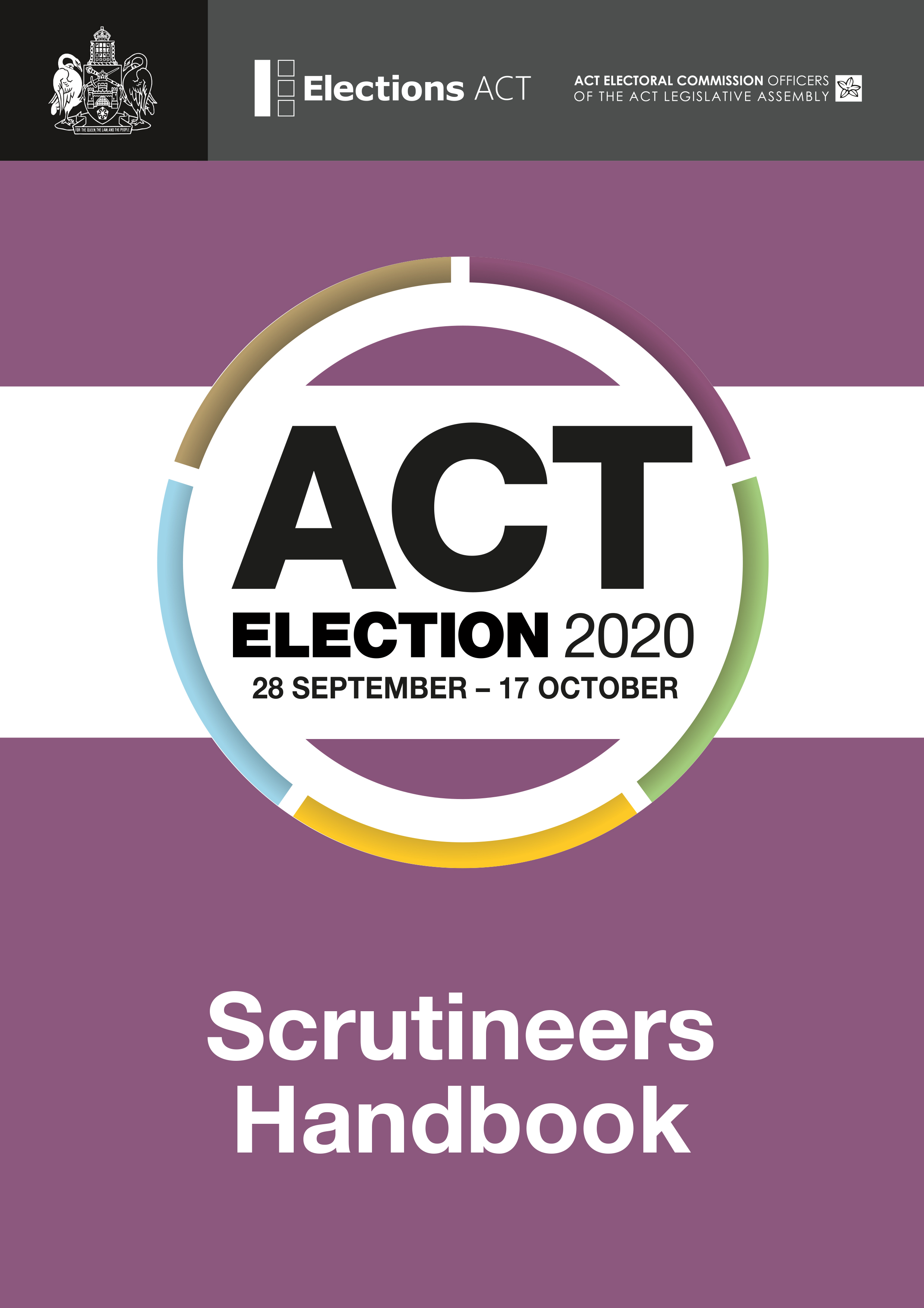Information for Candidates
The candidate nomination period for the 2024 ACT election opens on 13 September 2024.
Candidates are able to commence their campaign for election at any time. There is no requirement for candidates to be formally nominated or to have had their nomination declared by the Electoral Commissioner before they may start campaigning.
However, there are legal requirements that must be met. Most campaign material must be authorised in compliance with the Electoral Act. There are also financial disclosure obligations that must be met.
Relevant factsheets and publications for candidates:
- The 2024 party and candidate election briefing recording is available on our YouTube channel:
youtu.be/bK3UwuNRAL8 - Questions and answers taken at party and candidate briefing - click here
- 2024 Candidate information handbook - pdf 2707 kb
- Authorising electoral material fact sheet -pdf 209 kb
- Candidate statement fact sheet - pdf 277 kb
- Electoral expenditure cap fact sheet - pdf 207 kb
- Funding and disclosure publications
- Inaccurate and misleading electoral advertising fact sheet - pdf 217 kb
- Video - Counting the votes - How Hare-Clark works - 62.7 mb
- Nomination of candidates fact sheet -pdf 259 kb
- Non-party candidates fact sheet - pdf 557 kb
- Prohibited donors fact sheet - pdf 322 kb
- Scrutineer's handbook 2020 - pdf - 948 kb
The Candidate's Information Handbook for the 2024 ACT election is intended to summarise the electoral law relating to candidates for the 2024 ACT Legislative Assembly. It is recommended that all prospective candidates download the Candidate's Information Handbook, or contact the Elections ACT for a printed version.
The handbook incorporates the most recent Electoral and Road Safely Amendment Act 2023 provisions that were passed by the Legislative Assembly in November 2023.
Candidates should also familiarise themselves with the Transport Canberra and City Services Directorate brochure entitled Electoral advertising and the Public Unleased Land (Movable Signs) Code of Practice 2023
The recent amendments to the Public Unleased Land Act 2013, allow an authorised person to immediately remove electoral advertising signs, without providing prior notice to the owner of the sign, from public unleased land where the signs are not compliant with statutory requirements.
Candidates should also familiarise themselves with the Scrutineer's Information Handbook (pdf - 948 kb).
The 2024 Scrutineer information handbook, forms and other election related manuals will be published on this webpage early 2024.
Scrutineer appointment forms are available (pdf file - 25 kb).
Qualifications
- an Australian citizen;
- at least 18 years of age; and
- an ACT elector or entitled to be an ACT elector.
There are a number of exceptions explained in detail in the full version of the Candidate's Information Handbook.
Nominations
Candidates can be nominated in two ways:
- non-party candidates can be nominated by twenty electors who are entitled to vote for the electorate for which the candidate is being nominated; or
- party candidates can be nominated by the registered officer of the registered political party.
A nomination must be made on the approved form provided by the ACT Electoral Commission.
Political parties and prospective non-party candidates will be able to request a form from Elections ACT from 6 October 2024. The nomination form can be emailed, posted or collected from the Elections ACT office after 6 October 2024.
The nomination period for the 2024 ACT election opens on 13 September and closes at 12 noon on 24 September.
It is important to note that prospective candidates can commence their campaign at any time. Candidates do not have to be formally nominated or have their nomination declared by the Electoral Commissioner before they begin campaigning.
A deposit of $250 must accompany each candidate's nomination. EFTPOS funds transfer is the preferred method of payment at the time of nomination. Cash or banker’s cheque are permissible. A personal cheque is not acceptable.
The deposit is returned to a candidate if:
- the candidate is elected; or
- at the time at which the candidate is excluded during the counting of preferences, the candidate's total votes equal or exceed 20% of the quota for the election; or
- the candidate is neither elected nor excluded during the counting of preferences, and the candidate's total votes equal or exceed 20% of the quota for the election at any stage of the count.
Candidates will be listed on ballot papers in either "party grouped" or "ungrouped" columns. Party candidates will be grouped together in a column for their party. Where only one party candidate stands in an electorate, that candidate will be listed in an ungrouped column. All non-party candidates will be listed in an ungrouped column. An ungrouped non-party candidate can choose to have the word "Independent" printed under his or her name on the ballot paper.
The Electoral Commissioner will conduct a random draw to determine the position of each group for each electorate. Each particular group will appear in the same column position on every ballot paper for their electorate. The ungrouped column or columns will be listed on the right-hand side of the ballot paper.
Candidates' names will be printed in each column using the "Robson rotation" method. Candidates' names in each column are printed in different orders on consecutive ballot papers so that no candidate in a column has the advantage of appearing in the same position on every ballot paper.
More information on nominations is provided in the Candidate's Information Handbook and details on party registration may be found in the Party Registration Guideline.
Electoral offences
There are a range of electoral offences relating to the responsibilities of candidates and to election campaigning generally. These are explained in full in the Candidate's Information Handbook.
Authorisations for TV and radio political advertising are regulated under the Commonwealth's Broadcasting Services Act 1992. (TV and radio are under Commonwealth jurisdiction under the Constitution.) The responsible authority is the Australian Communications and Media Authority. For the relevant rules for TV and radio political advertising click here.
Requirements for authorising printed electoral matter (including in an electronic form such as an internet site) are regulated under the Electoral Act 1992 and are outlined in the handbook.
Candidates should also familiarise themselves with the Transport Canberra and City Services Directorate brochure entitled Electoral advertising and the Public Unleased Land (Movable Signs) Code of Practice 2023.
Candidates may appoint scrutineers to represent them at every polling place on election day and at each early voting centre in the ACT during the two weeks before election day. Candidates may also appoint scrutineers to represent them at every scrutiny centre at which votes are being counted or a "preliminary scrutiny" of declaration votes is taking place.
Scrutineers
Candidates must appoint scrutineers by supplying a written notice to the Electoral Commission. Appointment forms are available for appointing scrutineers (pdf file - 25 kb).
Each scrutineer must sign an undertaking on the approved form (attached to the appointment form) that he or she will not attempt to influence the vote of an elector and that he or she will not disclose any knowledge acquired concerning the vote of any elector.
More information on scrutineers is provided in the Candidate's Information Handbook or in the Scrutineers Information Handbook.
Election funding
Public funding is available to parties and independent candidates contesting an election. The public funding rate for the period from 1 January 2024 to 30 June 2024 is set at 1000.369 cents and provided to those parties and independent candidates receiving at least 4% of the formal first preference votes cast in an election.
No person is obliged to accept public funding.
More information on election funding is available from this site.
Disclosure of donations and expenditure
All candidates contesting an election are required to submit details of donations received, debts incurred, and expenditure undertaken in relation to the election. These details for party candidates are included with the details provided by party groupings. These details are made public. More information on disclosure requirements is available from this site or in the Candidate's Information Handbook and the handbook "Funding, expenditure and financial disclosure - 2024 Election".













